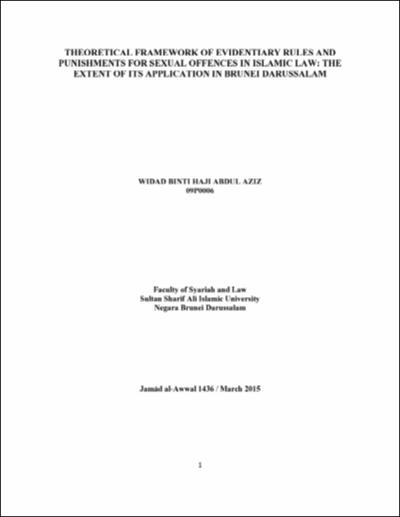| dc.contributor.author | Widad binti Abdul Aziz | |
| dc.date.accessioned | 2019-06-19T02:33:15Z | |
| dc.date.available | 2019-06-19T02:33:15Z | |
| dc.date.issued | 2015 | |
| dc.identifier.citation | Widad binti Abdul Aziz. (2015). Theoretical Framework of Evidentiary Rules and Punishments for Sexual Offences in Islamic Law: The Extent of its Application in Brunei Darussalam. Universiti Islam Sultan Sharif Ali. | en_US |
| dc.identifier.uri | https://e-ilami.unissa.edu.bn:8443/handle/20.500.14275/1511 | |
| dc.description.abstract | This research focuses on the evidentiary rules and punishments for sexual offences under Islamic law. Basically, sexual offences under Islamic law stem from the transgression of the prescribed decency and social etiquettes found in the Qur’Én and Sunnah. A mere act of gazing between the non-maÍram without justifications is considered as sinful in Islam, and zinÉ is the most vastly elaborated sexual offence by the Muslim jurists. Sexual acts under the man-made law are also made punishable according to the enforced legislations. Nevertheless, the nature of the sexual offences, hence the evidentiary rules and punishments, may differ from those found under the Islamic law. Sexual offences in the Laws of Brunei Darussalam are dealt both by the Shari’ah and Civil courts in accordance with the prescribed jurisdictions. The limited jurisdiction of the Shari’ah courts and the significant jurisdiction of the Civil courts to try most of the sexual offence cases thus raise question as to the extent of the application of Islamic law of evidentiary rules and punishments in the existing laws. This research examines the nature of sexual offences under Islamic law, the evidentiary rules and punishments and to observe such in the existing Laws of Brunei Darussalam. The research methodology involves a library-based research, attachments at relevant agencies and interviews with the authorized officers. The researcher makes reference to classical and contemporary Islamic law literatures to trace the views and theories of evidence and punishment of sexual offences by Muslim scholars. This research finds that the evidentiary rules and punishments under Islamic law in relation to sexual offences are –for the time being- not fully observed in the laws of Brunei Darussalam. The practice of dual legal system in the administration of justice somehow affects the observation and application of Islamic evidentiary rules and punishments in the country. Therefore, this research will conclude the comparative study of evidentiary rules and punishments under both laws in order to provide an overview on the theory and practice in Brunei Darussalam which are to be considered for the prospect implementation of Islamic law in the country. | en_US |
| dc.language.iso | en | en_US |
| dc.publisher | Universiti Islam Sultan Sharif Ali | en_US |
| dc.subject | Sex Crimes | en_US |
| dc.title | Theoretical Framework of Evidentiary Rules and Punishments for Sexual Offences in Islamic Law: The Extent of its Application in Brunei Darussalam | en_US |
| dc.type | Thesis | en_US |
| dc.faculty | Faculty of Syariah and Law | en_US |
| dc.additionalinformation | Page Number: 453 pages | en_US |
| dc.supervisor | Assoc. Prof. Dr. Naamane Djeghim | en_US |
| dc.studentID | 09P0006 | en_US |
| dc.keyword | Kesalahan Seksual | en_US |



